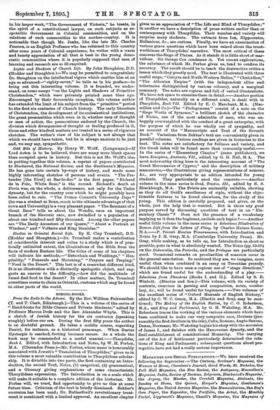SCHOOL-BOOKS.
Prom the Exile to the Advent. By the Rev. William Fairweather. (T. and T. Clark, Edinburgh.)—This is a volume of the series of -" Hand-books for Bible Classes and Private Students," edited by Professor Marcus Dods and the Rev. Alexander W hyte. This is a sketch of Jewish history for the six centuries (speaking Toughly) before our era. During the first fifty years the author is on doubtful ground. He takes a middle course, regarding Daniel, for instance, as a historical personage. When Darius Hystaspis is reached, footing becomes secure. As a whole the book may be commended as a useful manual.—Thucydides, Book I. Edited, with Introduction and Notes, by W. H. Forbes, M.A. (Clarendon Press.)—Mr. Forbes, whose name is honourably associated with Jowett's " Translation of Thucydides," gives us in this volume a most valuable contribution to Thucydidean scholar. ship. It is divisible into two parts, the first containing an Intro- duction, the second Text, Notes, (1) exegetical, (2) grammatical, and a Glossary giving explanations of some characteristic Thucydidean expressions. The Introduction is on a scale which will make it suitable to a complete edition of the historian. Mr. Forbes will, we trust, find opportunity to give us this at some future time. Criticism of the text is briefly dismissed. Bekker's recension has been used; Dr. Rutherford's revolutionary treat- ment is mentioned with a limited approval. An excellent chapter gives us an appreciation of "The Life and Mind of Thucydides ; " in another we have a description of prose writers earlier than or contemporary with Thucydides. Their number and variety will surprise many students. The extracts from Ion, Hippocrates, Hellanicus, &c., are curious. Finally, we have an examination of various grave questions which have been raised about the trust-4 worthiness of Thucydides' narrative. The most critical of these concerns the Siege of Platna. As it stands it is little short of mar- vellous. Sir George Cox condemns it. Yet recent explorations,, the substance of which Mr. Forbes gives us, tend to confirm its accuracy. The result should be to teach the destructive critics a lesson which they greatly need. The text is illustrated with three useful maps, "Corcyra and North-Western Hellas," " Chalcidicas," "The Athenian Empire" (with the independent allies and tributaries distinguished by various colours), and a marginal summary. The notes are copious and full of varied illustrations. We have not space to examine them in detail.—Another portion of Thucydides, naturally on a different scale, is dealt with in Thucydides, Book VII. Edited by E. C. Marchant, M.A. (Mac- millan and Co.)—The " Prolegomena " consist of a note on the " Siege Works of Syracuse," a brilliant sketch of the character of Nicias, one of the most admirable of men, who was un- happily overweighted with the conduct of a great enterprise, with the purpose of which he was wholly out of sympathy, and an account of the " Manuscripts and Text of the Seventh Book." Variations from Bekker's text are conveniently given in parallel columns. Various readings are given in footnotes to the text. The notes are satisfactory for fullness and variety, and the Greek index will be found more than commonly useful.— In the series of "Elementary Classics" (same publishers), we have Xenophon, Anabasis, VII., edited by G. H. Nall, M.A. The most noteworthy thing here is the interesting account of " The Greek Mercenaries of Cyprus," and the description of military manoeuvres,—the illustrations giving representations of armour, &c., are very appropriate to an edition intended for young students. They particularly need the concrete.—Another volume in the same series is Ovid, Tristia, III., edited by E. S. Shuckburgh, M.A. The Tristia are eminently suitable, showing as they do all Ovid's excellences of style, without the objec- tionable features to be found elsewhere, for the study of the young. This edition is carefully prepared, and gives, on the whole, just the help that is wanted. But is there any good purpose served by discussing questions of text in an " Ele- mentary Classic " ? Does not the presence of a vocabulary implying as it does the beginner, exclude such topics 7—Another useful little volume in the same series is Selections Illustrative of Roman Life from the Letters of Pliny, by Charles Haines Keene, M.A.—P. Terenti Houton Timorumenos, with Introduction and Notes by J. H. Gray, M.A. (Cambridge University Press). Mr. Gray, while making, as he tells us, his Introduction as short as possible, puts in what is absolutely wanted. The Notes (pp. 59-69) on the Didascalia, the Periocha, and the Prologus are particularly good. Occasional remarks on peculiarities of scansion occur in the general annotation. So scattered they are, we imagine, more useful than when combined in an essay on Terentian prosody. We should like to have seen a copious use of " stage directions," which are found useful for the understanding of a play.— Selections from Phaedrus (Books I. and II.). Edited by S. E. Winbolt. (Blackie and Son.)—This volume, with its variety of contents, exercises in parsing and composition, notes, vocabu- lary, &,c , will be found useful for beginners.—Two volumes of the excellent series of " Oxford Manuals of English History," edited by C. W. C. Oman, M.A. (Blackie and Son), may be men- tioned ; The Making of the English Nation, by C. G. Robertson, M.A., and King and Parliament, by G. H. Wakeling, M.A. Mr. Robertson traces the working of the various elements which have been combined to make our very composite race, Iberians (pre- sumably the first dwellers in the isle), Celts, Romans, Anglo-Saxons, Danes, Normans; Mr. Wakeling begins his story with the accession of James I., and finishes with the Hanoverian dynasty, and the final establishment of constitutional Monarchy. The carrying out of the Act of Settlement particularly determined the rela- tions of King and Parliament ; subsequent questions about pre- rogative have not had a really serious importance.


































 Previous page
Previous page